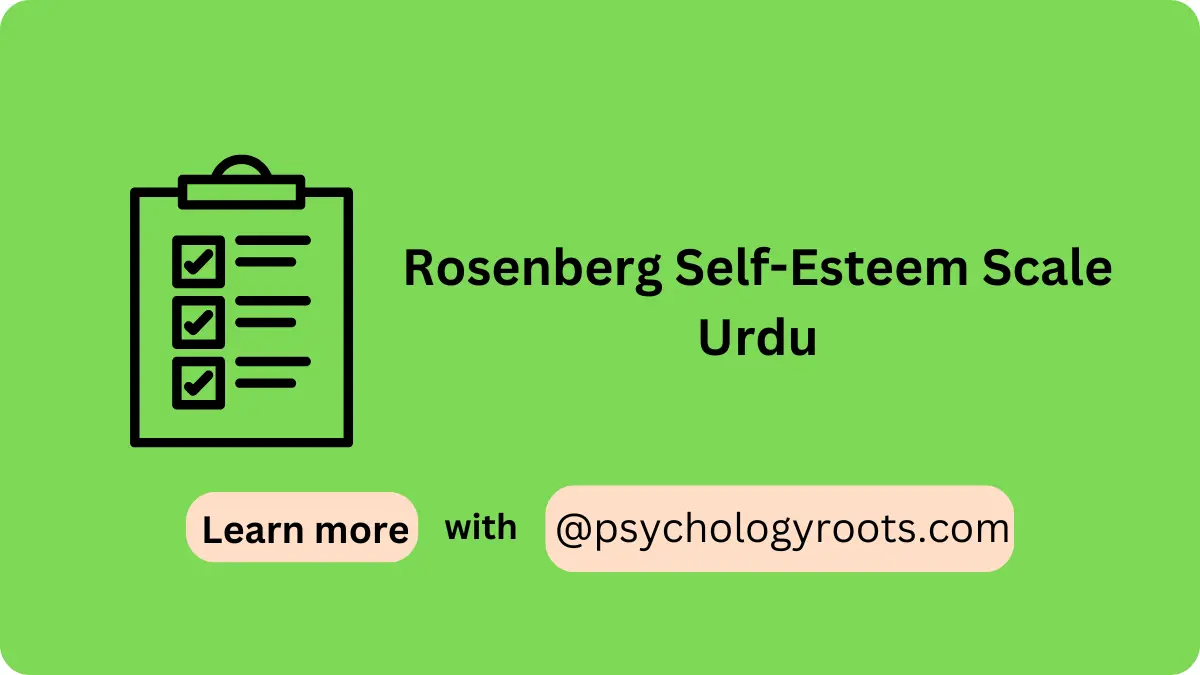Table of Contents
Rosenberg Self-Esteem Scale Urdu
Here in this post, we are sharing the “Rosenberg Self-Esteem Scale Urdu”. You can read psychometric and Author information. We have thousands of Scales and questionnaires in our collection (See Scales and Questionnaires). You can demand us any scale and questionnaires related to psychology through our community, and we will provide you with a short time. Keep visiting Psychology Roots.
About Rosenberg Self-Esteem Scale Urdu
Scale Name
Rosenberg Self-Esteem Scale Urdu
Author Details
Morris Rosenberg
Muhammad Rizwan (muhammad29psy@yahoo.com), Ms Sidra Malik, Navid Jamil Malik, and Razi Sultan Siddiqui
Translation Availability

Background/Description
The Rosenberg Self-Esteem Scale (RSES) is a widely recognized measure of global self-esteem, originally developed by Morris Rosenberg in 1965. It consists of 10 items that evaluate an individual’s overall sense of self-worth and acceptance. Respondents rate each item on a Likert scale, assessing how strongly they agree or disagree with statements about themselves.
In 2017, the scale was translated and validated in Urdu by Rizwan, Malik, and colleagues to make it culturally relevant for use in Pakistan. The Urdu version maintains the integrity of the original tool while incorporating linguistic and cultural adaptations. The validation study conducted in Pakistan demonstrated its reliability and validity, making it a valuable resource for assessing self-esteem in Urdu-speaking populations. The scale is extensively used in clinical, educational, and research settings to understand self-esteem-related constructs.
Administration, Scoring and Interpretation
- Obtain a copy: Ensure access to the Urdu version of the Rosenberg Self-Esteem Scale and relevant scoring guidelines.
- Explain the purpose: Inform respondents that the tool assesses their self-esteem and perceptions of self-worth.
- Provide instructions: Guide respondents to rate each of the 10 items based on their agreement with the statements.
- Approximate time: The scale typically takes 5–10 minutes to complete.
- Administer the scale: Conduct the assessment in a comfortable and distraction-free setting, ensuring the respondent understands the instructions.
Reliability and Validity
- Reliability: The Urdu version of the RSES demonstrates high internal consistency, with a Cronbach’s alpha reported above 0.80 in Pakistani populations.
- Validity: The Urdu version exhibits strong construct validity, correlating well with measures of psychological well-being and self-concept, as reported in the adaptation study.
Available Versions
10-Items
Reference
Rizwan, M., Malik, S., Malik, N. J., & Siddiqui, R. S. (2017). Urdu Rosenberg self-esteem scale: an analysis of reliability and validity in Pakistan. Sociol Int J, 1(2), 00010.
Rosenberg, M. (1965). Society and the adolescent self-image.
Important Link
Scale File:
Frequently Asked Questions
Q1: What does the Urdu Rosenberg Self-Esteem Scale measure?
It measures global self-esteem and self-worth in Urdu-speaking individuals.
Q2: How is the scale scored?
The scale uses a 4-point Likert scale, with higher scores indicating higher self-esteem.
Q3: Is the Urdu version culturally adapted?
Yes, the Urdu version has been linguistically and culturally adapted for use in Pakistan.
Q4: Who can administer this scale?
It can be administered by psychologists, counselors, or trained researchers.
Q5: Can it be used with adolescents?
Yes, the scale is suitable for adolescents and adults.
Disclaimer
Please note that Psychology Roots does not have the right to grant permission for the use of any psychological scales or assessments listed on its website. To use any scale or assessment, you must obtain permission directly from the author or translator of the tool. Psychology Roots provides information about various tools and their administration procedures, but it is your responsibility to obtain proper permissions before using any scale or assessment. If you need further information about an author’s contact details, please submit a query to the Psychology Roots team.
Help Us Improve This Article
Have you discovered an inaccuracy? We put out great effort to give accurate and scientifically trustworthy information to our readers. Please notify us if you discover any typographical or grammatical errors.
Make a comment. We acknowledge and appreciate your efforts.
Share With Us
If you have any scale or any material related to psychology kindly share it with us at psychologyroots@gmail.com. We help others on behalf of you.